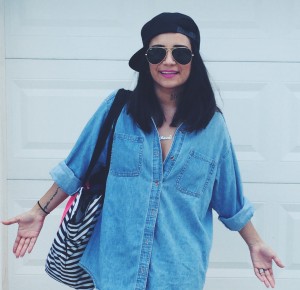by Priscila Dorcas Mojica, MDiv3
 While at VDS I, like many of us, have been forced to think critically about myself within my context. Amidst this I reclaimed this racialized slur that I had been called before but never really understood why I tried hard to distance myself that said identity, other than to appease others. My academic journey at VDS led me to write about this aforementioned reality, and ended up writing about chongas for my M.Div. thesis.
While at VDS I, like many of us, have been forced to think critically about myself within my context. Amidst this I reclaimed this racialized slur that I had been called before but never really understood why I tried hard to distance myself that said identity, other than to appease others. My academic journey at VDS led me to write about this aforementioned reality, and ended up writing about chongas for my M.Div. thesis.
You see, I am a chonga and it explains everything about who I am and how I move through the world. A chonga is a Latina who does not endorse societal norms of respectability imposed on brown female immigrant bodies. We utilizes our bodies, aesthetics, and comportment – whether intentional or not – to disrupt assimilation within the imposition of white culture.
Chonga is a racialized term precisely because we are Latinas, who also tend to come from a barrio/working-poor context, which means that we are the darker shades of Latinidad. We tend to speak Spanish fluently because we are either new immigrants or our “parents” are.
Chongas tend to be seen, through our hypervisible, hyperfeminine and hypersexual clothing, as contrasted with the larger USA “appropriate attire” narrative. Chongas do not wear the recommended clothing of respectable young girls: pastels, looser fit, very little to not makeup, and straight “kept” hair. Instead chongas usually wear: “sexy” clothes, only defined as much because it is form fitting or shorter skirts, dresses, or shorts and/or tight blouses. We also tend to look cheap, and are categorized as “hood” because we are functioning with our class and social location – and what is available for our monetary access.
Aside, from aesthetics, chongas comportment is also hypervisible. Chongas tend to be louder, meaner, and more aggressive when compared to more “respectable” immigrants and/or people who have acquiesced to white culture. Chongas speak at a volume and with a tone that reflects a particular class, which is rejected as crass by outsiders. This rejection however, is a reflection of a deep societal desire to locate ourselves as close as we can to whiteness, and further away from poor brown people. It is important to note that in the communities we live in, however, we are not considered loud, mean, and aggressive.
The bulk of my work is in upholding this subculture because I want to know what would happen if we dared to call these working poor brown female immigrant bodies important due to our political social resistance? What would happen if we bring to the center these marginalized bodies and as a society allowed them to exist – not that we would not otherwise – but what would happen?
As I am soon to graduate VDS, I am aware that the scholarship that needs to come out of me is still developing. Currently, I have been accepted into an MA in International Development and Social Change, where I seek to specifically address the global impact of bodies of resistance like these.